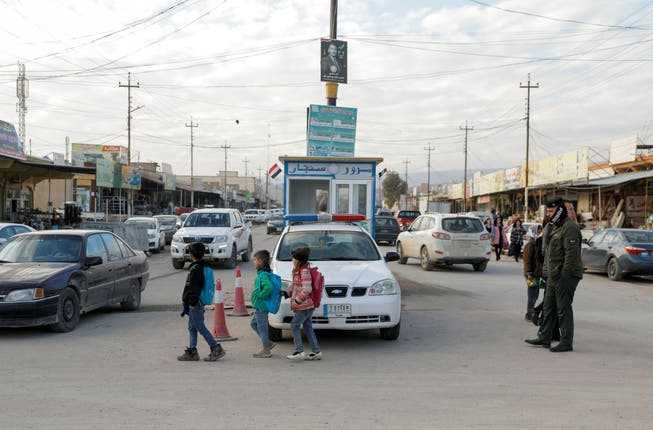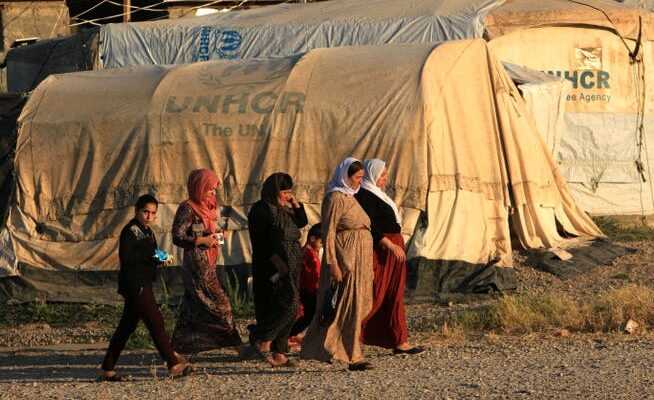At the same time as a Turkish offensive against the PKK guerrillas in northern Iraq, the Iraqi army launched an attack on Yazidi militias in the Sinjar region. Many Yazidis suspect that Baghdad is acting under pressure from Turkey.
Eight years after the IS crimes, around 200,000 Yazidis are still living in displaced persons’ camps in northern Iraq.
The Yazidis in Iraq are on the run. Once again. Thousands of members of the religious minority have fled the area around the northern Iraqi city of Sinjar in recent days. This time, however, the wave of refugees was not triggered by extremists from the Islamic State (IS), who committed the most serious crimes against the minority in the area eight years ago, but by soldiers from the Iraqi army.
At the beginning of the week, army units with armored vehicles and heavy artillery advanced into villages around the town of Sinjar west of Mosul. The attack was aimed at the Yazidi Resistance Units, a local Yazidi militia that controls part of the border region between Iraq and Syria. The militia, better known by its Kurdish acronym YBS, was formed after the IS crimes in 2014.
Proximity to the PKK serves as an excuse
The Iraqi army demanded that the militiamen close their checkpoints and withdraw from the area. The army leadership said it would not allow armed forces to undermine state authority. In the ears of many Yazidis, this sounds downright cynical. The army and the peshmerga of the Kurdish state fled in the summer of 2014, leaving the Yazidis defenseless to the jihadists.
The only ones who rushed to help the minority at the time were fighters for the Kurdistan Workers’ Party (PKK) from Turkey and their allies in neighboring Syria, the Kurdish Self-Defense Units (YPG). They later also trained militia fighters in Sinjar. At least politically and ideologically there are close ties to this day.
However, many Yazidis and observers in the region consider this justification to be an exaggeration. They believe the Iraqi central government is acting under pressure from Turkey. Ankara considers all groups associated with the PKK to be terrorists. Turkey has repeatedly used drone attacks in the Sinjar area, killing senior Yazidi fighters who fought ISIS eight years ago, saving thousands of lives.

Aid organizations and the UN have invested millions of francs so that the Yazidis can return to Sinjar. Now many have fled again.
Kurds against Kurds
The Iraqi attack on the Yazidi militia coincides with a new offensive by the Turkish army against the PKK in northern Iraq. On April 18, commandos marched into the several hundred kilometers long border area between the Zab River and the border triangle between Turkey, Iraq and Iran. At the same time, Turkish fighter jets and drones began bombing the area. In addition to the Kandil mountains, where the PKK has its headquarters, the impassable mountains in the region have been important retreat areas for the PKK for decades.
After the army succeeded in expelling most of the PKK from Turkey, the “terrorists” are also to be rooted out root and branch in Iraq and Syria. The Iraqi government has condemned the attack. The Turkish President Recep Tayyip Erdogan expressly thanked Baghdad as well as with the Kurdish regional government in Erbil for the “close cooperation”. Erdogan can count on the active support of the Kurdistan Democratic Party (KDP) and the Barzani family, which dominates the area around the border with Turkey.
With the connivance of the KDP, the Turkish army has set up dozens of military bases in the region. While Turkish soldiers are engaged in heavy fighting with PKK fighters, KDP peshmerga are deployed to cut off possible escape routes.
Two Europeans arrested
Because of its proximity to the Syrian border, the Sinjar region is a strategically important area in the fight against the PKK. Whoever controls it cuts off important PKK supply and smuggling routes. Erdogan announced years ago that he would not allow a “second Kandil” to emerge in Sinjar. Parallel to the Turkish offensive, the Iraqi army also advanced against the Yazidi militia in the Sinjar region on April 18.
During the operation, Iraqi soldiers arrested two foreign activists, Marlene Förster of Germany and Matej Kavicic of Slovenia, both of whom also work as freelance journalists. Both are now in a Baghdad prison. It is unclear exactly what they are charged with.
In addition to Baghdad, the Kurdish state, above all the KDP, is also claiming the area around Sinjar. In October 2020, both sides agreed on joint management. In addition to rebuilding the region, the agreement provided for the withdrawal of the PKK and the recruitment of local Yazidi security forces. However, it was not implemented. Instead, today the Iraqi army, federal police, KDP Peshmerga, pro-Iranian militias, and Yazidi militias like the YBS share control of the region.
Yazidis want international protection
All sides have recruited Yazidis. In doing so, they do not contribute to the safety of the minority. Rather, it weakens and divides the Yazidis, and it increases the fear of further crimes such as genocide by IS. In 2014, the extremists murdered thousands of Yazidi men and abducted, enslaved and raped tens of thousands of women and girls.
Aid organizations and the UN have invested a lot of money so that the surviving Yazidis can return. However, due to the continuing insecurity in Sinjar, most of them still live in displaced persons camps in Kurdistan. Tens of thousands fled to Europe.
After the recent fighting, Nobel Peace Prize winner and survivor Nadia Murad called for international intervention to resolve the dispute and protect civilians. In Europe and the USA, of course, there is a lack of political will to get involved in the complicated conflict. As long as nothing changes, the Yazidis will remain at the mercy of the more powerful – and the threats from Ankara.
